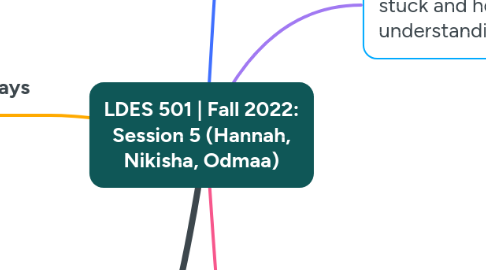
1. Big Takeaways
1.1. Threshold Concepts and Troublesome Knowledge: Linkages to Ways of Thinking and Practising within the Disciplines
1.1.1. Many of us experience the troublesome knowledge of threshold concepts during our time of learning.
1.1.2. Threshold concepts act as a bridge between the student and the subject and aims at aiding understanding.
1.2. Threshold concepts and troublesome knowledge: implications for course design and evaluation
1.2.1. Knowledge moves you into different spaces.
1.2.2. It is important for teachers to be engaged in the process of learning and transformative understanding
1.2.3. If student manages to get into the troublesome space then she will be able to get to know new things, new perspectives. If they don't go in there they will be stuck.
1.3. George Kuh, High Impact Practices
1.3.1. HIPs are a valuable aspect of pedagogy, but can often be difficult to implement.
1.4. Jesse Stommel, Instructional Designers Are Teachers
1.4.1. Instructional design incorporates many disciplines -- they become a campus "jack of all trades."
2. My Biggest Takeaway! https://www.menti.com/aleknbx3sn2g
3. How do we design in context?
3.1. Collaborative Assignments and Projects (a HIP) involves students working together on an assignment or project. How do teachers ensure that all students are participating equally and not just relying on the most active people in the group to do all the work? (Fikayo)
3.1.1. What are some HIPs in an informal learning setting? (Paul) What's the impact of distance learning on our thinking about HIPs? (Paul)
3.2. What are the key differences in teaching approaches/practices between the teaching of threshold and core concepts? (Ruihan)
3.3. Is there any specific way to handle the epistemological obstacles to ease the 'resistance difficulties for the pupils? (Ambika)
3.4. To think from the undergraduate student side, what is research? What do they think when they run into this word or when they have to do some research? Could it even be something close to what professors want them to perceive and do? (Odmaa)
3.5. How can we apply the theory of threshold concepts outside the classroom, for the upbringing of children? (Haya)
4. Where and why do students get stuck and how can we design for understanding?
4.1. Would students benefit from instructors explicitly explaining the notion of a threshold concept and identifying threshold concepts when they were approaching one in the syllabus? (Aakansha)
4.1.1. Is the counter-intuitiveness of threshold concepts (in some cases, particularly depreciation) based on human-made regulatory standards? (Pulkit)
4.2. Apart from testing to determine what common roadblocks students hit, what are some other strategies that can be used to identify threshold concepts and troublesome knowledge in other disciplines like History? (Aakansha)
4.2.1. How do you actively find ways to teach a concept to students from a clean-slate perspective if the concepts that were not intuitive to you at the onset are now second nature? (Aakansha)
4.3. The examples they illustrate point to specific disciplines – science, economics, etc. but can’t a threshold concept be a concept that integrates all of those disciplines? (Hannah)
4.3.1. Is the idea of threshold concepts a threshold concept in the discipline of learning design? (Eric)
4.4. Is it possible that teachers have little experience in that field and, therefore, cannot explain satisfactorily to students on real examples? (Aysu)
4.4.1. how do we differentiate that the student is on the threshold or something else? (Odmaa)
4.4.1.1. How can an educator take responsibility to help students bridge the gap between the threshold concept and the real world, especially when they function based on how the curriculum is designed? (Nikisha)
4.5. Is it possible for college students to graduate on time when they implement all of the strategies while in college. Can it be completed within the next four years? (Won)
4.6. Apart from the Alien and tacit Knowledge, how do we properly train our brain to recall and enhance both ritual and inert Knowledge? (Ambika)
4.7. What are some tangible metacognition strategies that help with mastering threshold concepts? (Eric)
4.7.1. If a student encounters a troublesome problem in one area and wants to work hard to get past the threshold, can we integrate multiple thresholds to solve it more efficiently? (Tingjie)
5. What is the role of an instructional designer?
5.1. Will instructors, learners, and instructional designers have their own variations of threshold concepts on the same subject? (Paul)
5.1.1. How can we ensure we align our understandings in the process of instructional design? (Paul)
5.2. How do instructors solve the need for individual contextualization? (Stacy)
5.3. What if instructors used their knowledge to discover key ideas and then provided students with the time, space, and support needed to grasp them? Would this enhance the likelihood of pupils developing the abilities required for lifetime learning? (Frank)
5.3.1. It is also a much more difficult process for educators to abandon what they previously believed, what will be some good ways to achieve so? (Frank)
5.4. Do instructors understand the threshold concept themselves? Does the threshold concept appear to be the same for everyone learning the same subject? Should instructors receive training on teaching threshold concepts? (Ruihan)
5.4.1. If so, what will such training look like? How / should we evaluate instructors based on their understanding of threshold concepts? (Ruihan)
